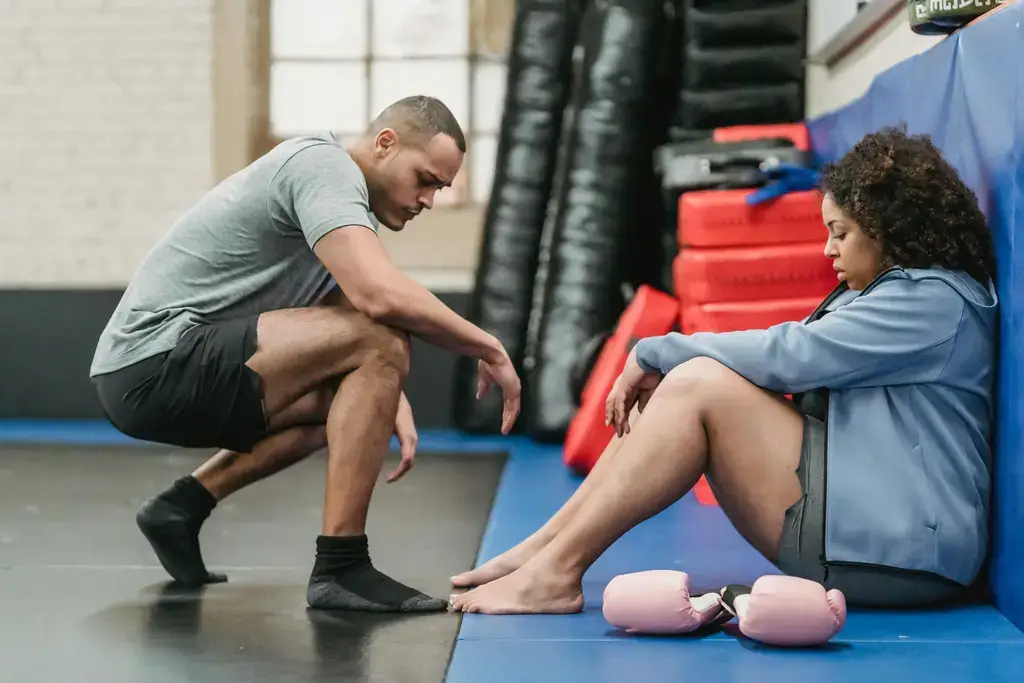Physical Address
304 North Cardinal St.
Dorchester Center, MA 02124
Physical Address
304 North Cardinal St.
Dorchester Center, MA 02124

Although overtraining may seem easy to recognize at first glance and primarily associated with inflammatory processes in the body and reduced working capacity, it very often comes with other symptoms.
These symptoms appear before a drop in performance, and if you recognize them in time, it will be easier for you to approach the problem, analyze it, and make the necessary modifications.
Overtraining often occurs because individuals want to achieve their goals immediately and now, lacking patience for the process. Another problem I, as a personal trainer, see is that these same individuals look up to professional athletes, bodybuilders, and various influencers from the fitness world who earn a living by exercising and living the fitness lifestyle.
Fitness professionals train quite hard, are genetically blessed, eat very high-quality food, have all the necessary supplementation, and generally get enough sleep. The average gym-goer, who also has a regular job during the week, family, and obligations, and tries to train like a professional without the necessary supplementation, nutrition, and quality rest, will run into trouble.
Even if we assume that you, as an amateur, have fulfilled all the listed items, we must not forget one factor – genetics. Genetics plays a huge role in how fast you will progress, how your muscles will look, and how much muscle mass you can naturally build.
Chasing the results of your idols will leave you without results, overtrained, with poor sleep, injuries, reduced work capacity, and disinterested in exercise. We want big results in little time.
We can very simply describe overtraining as a reduction in work capacity due to an imbalance between training and recovery, where intense training is (mostly) the main cause.
Here are some signs of overtraining:
Stagnation in training is always a sign that you need to change something in your exercise regimen. You know the saying “go hard or go home”? Well, maybe sometimes you should go home instead of the fitness center, because you can’t give 100% in every workout. You can give your maximum in other ways, whether you change the concept of training, reduce the load, increase TUT (time under tension), and rotate workouts with an emphasis on strength and volume.
To avoid overtraining, and at the same time provide your body with adequate recovery for further training progress, it would be desirable to implement “deload weeks.”
A deload week can be every 4th week of your training when your goal is to recover from heavy workouts. In this week, you can still do everything you would normally do, but with 55-60% intensity, while you can shorten the number of sets for additional exercises.
A change in your morning resting heart rate is a clear indicator that you are very likely overtrained. This refers to a pulse that has increased by 10% or more compared to your usual resting heart rate.
Athletes track their pulse, but amateur exercisers would also benefit greatly from using a heart rate monitor in their training, if not with weights, then at least with cardio forms of exercise. Keep in mind, your cardiovascular system needs training too, not just your muscles. Pay special attention to this factor.
Let’s be realistic, with quality nutrition, sleep, and training, you should feel energetic during the day, not tired. If you lack energy throughout the day and feel like you are dragging yourself, analyze your: training, sleep quality, nutrition, and perhaps the influence of a change in season.
If you have eliminated all elements that could affect your fatigue, and overtraining is not the case, pay attention to climate changes and the change of seasons. Are you familiar with spring fatigue? Yes, sometimes it is possible that you are susceptible to weather changes. For everything else, overtraining is a greater probability.
Training should strengthen our immune system, not weaken it. If we are sick more often and get ill more easily, an immune drop has very likely occurred. A weak immune system can be an indicator of overtraining.
An interesting fact is that many bodybuilders in the stages of preparation for a competition are known to get sick; this is a consequence of frequent, daily strenuous training combined with a restrictive diet.
High-intensity training can negatively affect your sleep, especially if you trained in the afternoon or evening. Your Central Nervous System (CNS) is still active, which is one reason why you have difficulty falling asleep.
Consuming stimulants before training such as coffee, energy drinks, and pre-workout matrices can further affect this problem. Limit the intake of stimulants until 4 PM, and sometimes move heavy workouts to the morning if possible.
If you still can’t sleep at night, you are very likely overtrained and need more quality rest. Your body is like an engine in a car. You cannot drive it all the time at 5000 RPM.
If you have these symptoms, you are very likely overtrained. Take a 7-10 day break from training, continue to eat well, and do not reduce food intake. Hydrate your body, eliminate stimulants and coffee, and include an evening walk.
Your imperative must be the recovery of the body from accumulated fatigue, so do not hesitate to go for a massage (which you should also have during heavy training). Don’t worry about your hard-earned muscles; they won’t go anywhere if you don’t exercise for a week.